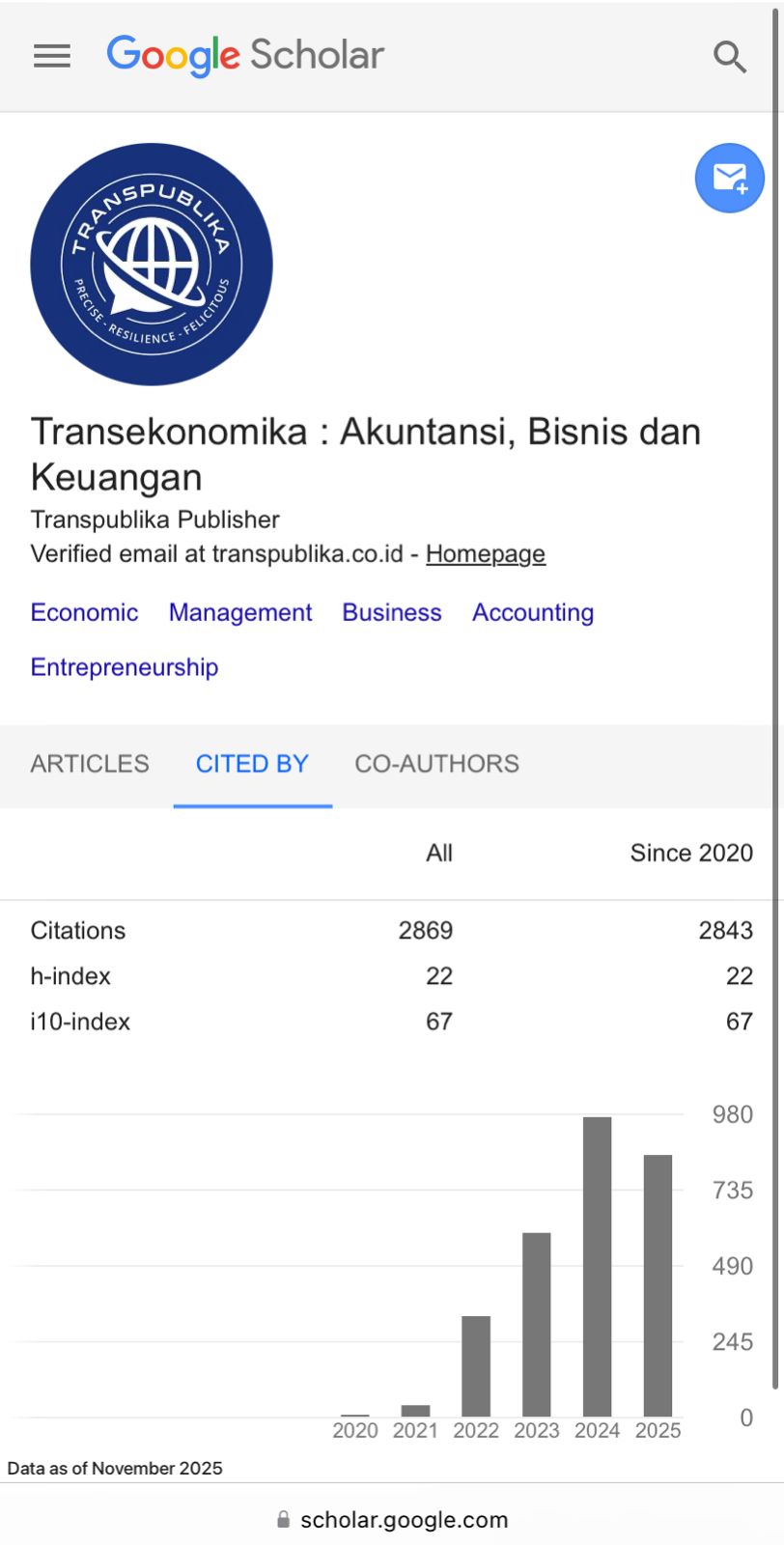EFEKTIVITAS SISTEM PENGENDALIAN INTERNAL DALAM RANGKA PENCEGAHAN KECURANGAN PENGELOLAAN DANA DESA
(Studi Kasus pada 9 Desa di Kecamatan Citeureup Kabupaten Bogor Jawa Barat)
DOI:
https://doi.org/10.55047/transekonomika.v3i2.389Keywords:
Fraud, Internal Control System, Village FundsAbstract
Fraudulent acts committed within the scope of agencies, both private and state, need to be avoided. In the village office environment, various efforts have been made to minimize and re-examine the management of village funds, one of which is by implementing an internal control system. This study aimed to know the role of internal control in anticipating the tendency of financial fraud in 9 villages in Citeureup District, Bogor Regency, West Java, regarding Environmental Control, Risk Control, Control Activities, Information and Communication and Monitoring. The research method used is descriptive qualitative method. Source of data from this research is primary data. Data collection techniques through interviews and questionnaires. The analysis technique used in this study includes various stages starting with distributing questionnaires, collecting, categorizing answers, conducting final assessments and classifying respondents' achievements. From research conducted, the findings revealed that the control environment reached 96.67%, risk control reached 100.00%, control activities achieved 85.56%, information and communication achieved 100.00%, performance monitoring achieved 100.00%, where all of these components are categorized as having a very important role in internal control and together the five components also have a yield of 94.61%, these categories play a very important role in internal control and suggesting that there are ethical and behavioral standards, there are internal examiners, there is a separation of duties and responsibilities and there is a safe place to keep money is to avoid misuse of village funds.
Downloads
References
Amanda, C., Sondakh, J. J., & Tangkuman, S. J. (2015). Analisis efektivitas sistem pengendalian internal atas persediaan barang dagang pada Grand Hardware Manado. Jurnal EMBA: Jurnal Riset Ekonomi, Manajemen, Bisnis Dan Akuntansi, 3(3).
Amrul, R., & Khotmi, H. (2016). Peranan Pengendalian Internal Dalam Mengantisipasi Kecenderungan Kecurangan Pengelolaan Keuangan Desa. Valid: Jurnal Ilmiah, 13(4), 384–389.
Anggara, M. R., & Sulindawati, N. L. G. E. (2020). Pengaruh Komitmen Organisasi, Sistem Pengendalian Internal, Moralitas Individu, Dan Itegritas Terhadap Kecenderungan Kecurangan (Fraud) Pada Pengelolaan Keuangan Desa (Studi Empiris Pada Desa Se-Kabupaten Buleleng). JIMAT (Jurnal Ilmiah Mahasiswa Akuntansi) Undiksha, 11(3), 573–584.
Basri, Y. M., Fadilla, O., & Azhar, A. (2021). Determinants of Fraud in the Village Government: The Pentagon’s Fraud Perspective. Journal of Accounting Research, Organization and Economics, 4(2), 173–187.
Martini, R., Lianto, N., Hartati, S., Zulkifli, Z., & Widyastuti, E. (2019). Sistem pengendalian intern pemerintah atas akuntabilitas pengelolaan keuangan dana desa di Kecamatan Sembawa. Jurnal Akademi Akuntansi, 2(1).
Nainggolan, E. (2022). Pengendalian Internal, Ketaatan Aturan Akuntansi Dan Perilaku Tidak Etis Atas Kecenderungan Kecurangan Akuntansi.
Setianingsih, I. (2016). Kontribusi dana desa dalam menurunkan angka kemiskinan di Kabupaten Melawi. Jurnal Ekonomi Daerah (JEDA), 5(3).
Sugiyono. (2018). Metode Penelitian Kuantitatif, Kualitatif dan R&D (p. 336).
Wijayanti, R. P., & Setyawan, S. (2023). Literature Review: Analisis Pengendalian Internal Dan Upaya Pencegahan Kecurangan Akuntansi Sektor Publik. TRANSEKONOMIKA: AKUNTANSI, BISNIS DAN KEUANGAN, 3(1), 1–11.
Wonar, K., Falah, S., & Pangayow, B. J. C. (2018). Pengaruh kompetensi aparatur desa, ketaatan pelaporan keuangan dan sistem pengendalian intern terhadap pencegahan fraud dengan moral sensitivity sebagai variabel moderasi. Jurnal Akuntansi, Audit, Dan Aset, 1(2), 63–89.








.png)







.png)


.png)

.png)












